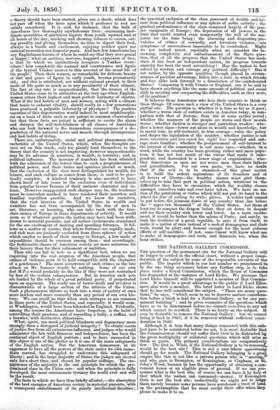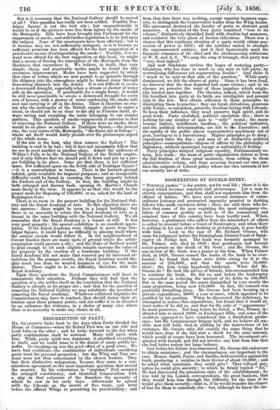THE NATIONAL GALLERY COMMISSION. Tam question of the permanent site
for the National Gallery will no longer be settled in the official closet, without a proper consi- deration of the subject by some of the responsible servants of the public. The inquiry which in our last number we pronounced. to be the one thing necessary before any further step, is to take place under a Royal Commission, which the House of Commons. has demanded at the instance of Lord Elcho. We presume that Lord Eloho himself will be appointed a member of that Commis- sion. It would be a great advantage to the public if Lord Elles- mere also were a member. His brief letter to Lord Elcho shows that he has well considered the subject. "There are many ques-
tions," he says, "which seem to me to deserve mature considera- tion before a brick is laid for a National Gallery., or for any per-
manent building" ; and he gives examples of the questions which have so to be determined before we commit ourselves to any act which cannot be revoked. There is no hurry on the subject. It may be desirable to remove the National Gallery ; but we cannot bring it back in 1857, if it be removed without sufficient consi- deration in NW.
Although it is true that many things connected with this sub,- ject have to be considered before we act, it is most desirable that the Commissioners should not suffer their view to be distracted by the great multiplicity of collateral questions which will arise as thick as gnats. The primary considerations are comparatively few. The first is, What, if the NationalGallery is to be removed„. would be the best site ? This is not a. case where opportunity should go for much. The National Gallery belonging to a great empire like this is not like a private person who is "moving," and who goes to Brompton, or Kensington, or Clapham, or St. John's Wood, because he has the opportunity of obtaining a con- venient house or an eligible piece of ground. If we can pro- nounce what is the best site, of course we can have it by help of that which the nation can command—money. If Kerisiugton.
Gore is not the best site, undoubtedly we ought not to lodge there. merely because some persons have purchased a tract of lan4. on the presumption that we must accept their offer when. they please to make it to us.
But is it necessary that the National Gallery should be moved at all ? This question has really not been settled. Possibly Tra- falgar Square is not the best site ; but unquestionably it
would be so if the pictures were free from injury by the smoke of the Metropolis. Bills have been brought into Parliament for the
suppression of smoke and still further legislation is to be had upon the subject. None Of the enactments have been effectual ; but is it because they are not sufficiently stringent, or is it because no sufficient premium has been offered for the best suggestion of a practicable means of extinguishing the smoke ? Possibly, if a re- ward were offered for the best suggestion on this head, we might find a means of freeing the atm.. there of the Metropolis from the blackness that encumbers it. "e believe, in truth, that very simple, cheap, and practicable modes might be found for this enormous improvement. Modes have been suggested by which that class of refuse which we now permit to go upwards through the chimney into the atmosphere might be turned down through descending channels into the drains. It is not difficult to secure a downward draught, especially when a stream. or shower of water aids in the operation. If practicable for a single house, it would
be still more practicable to create a downward draught for every row of houses, with a shower of water condensing the smoke into soot and carrying it off in the drains. There is therefore no rea-
son why the metropolis of the British empire should be under a cloud, or should not be as clear to the sky as Florence itself, al- ways saving and excepting the mists belonging to our insular position. This question of smoke-suppression is anterior to that of removing the National Gallery. If there were no smoke, there would be no place so suitable as Trafalgar Square,—the present
site, the very centre of the Metropolis, "the finest site in Europe " ; where art itself would, fairly preside over the picturesque aspect of the whole scene.
If the site is the best, why then remove the Gallery ? The building is said to be bad ; but it does not necessarily follow that we are to erect another in another place. Admit the unfitness of Wilkin's Folly to be the National Gallery of the British empire, and. it only follows that we should pull it down and put up a pro- per building in its place. Some say that there is not sufficient space. Not sufficient space on the North side of Trafalgar Square ? —it is a contradiction in terms. There is the barrack-ground behind, quite available for imperial purposes; and no insuperable difficulty could be found in securing the house property behind the Eastern end of the Gallery. In fact, the building might be
both enlarged and thrown back, opening St. Martin's Church more freely to the view. It appears to us that this would be the proper mode for disposing of 150,000/. or so, asked for the land at Kensington Gore.
There is no room in the present building for the National Gal- lery and the Royal Academy of Arts. To this objection there are
two answers : there might be room in a larger building ; but there is no necessity to retain the Royal Academy of Arts as a tenant in the same building with the National Gallery. We all remember that the Royal Academy is a tenant at will. It has very good property; the annual exhibition is an excellent specu- lation. If the Royal Academy were obliged to move from Tra- falgar Square, it could have no difficulty in placing itself where the annual crowds would follow it. in the neighbourhood of Covent Garden there are many spots of ground where the artist- corporation could procure a site ; and the Duke of Bedford would be glad enough to let such eligible tenants increase the value of his property by the erection of a handsome building. If the Royal Academy did not make that removal pay by increased at- tractions for the summer crowds, the Royal Academy would dis- play much less than its wonted keenness of eye for the main chance. There ought to be .no difficulty, therefore, with the Royal Academy.
Upon these questions the Royal Commissioners will have to concentrate their attention. Perhaps they will find that the question of a site settles itself on the conclusion that the National Gallery is already in its proper site ; and that for the question of removing the National Gallery we may substitute the question of reinoving the Royal Academy. Whatever collateral inquiries the Commissioners may have to conduct, they should fasten their at- tention upon these primary points, and not suffer it to be diverted by an embarras des richesses, in a choice of many sites where there is no necessity to make any choice at all.



































 Previous page
Previous page